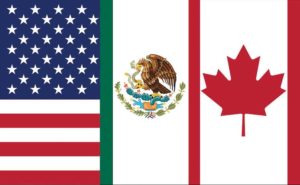Undermining NAFTA Is a Major Mistake
 AS WE MOVE rapidly through the rounds of negotiations designed to update the North American Free Trade Agreement (NAFTA), an observer can become so focused on today’s specific issues that they lose sight of the agreement’s value over the past 25 years.
AS WE MOVE rapidly through the rounds of negotiations designed to update the North American Free Trade Agreement (NAFTA), an observer can become so focused on today’s specific issues that they lose sight of the agreement’s value over the past 25 years.
For the potato industry, NAFTA has been a rousing success. The volume of potato trade that occurs between the three parties (Canada, Mexico, and the U.S.) has grown by hundreds of millions of dollars annually, benefiting all players. This economic activity is certainly not limited to our industry. A host of players from financial services, technology interests, value-added manufacturing, and agriculture all have seen the benefits that reducing trade barriers offers.
NAFTA Isn’t Perfect
Does that mean all industries have seen similar results from NAFTA? Certainly not. Even within the fruit and vegetable industry, commodities that are produced in short production windows have had those marketing windows encroached upon by sophisticated Mexican operations. Their experience with NAFTA has seen an erosion in their economic opportunities and necessarily a view that the agreement has failed to protect their interests.
Our own industry was targeted by retaliatory Mexican tariffs after the U.S. canceled a program that allowed Mexican trucks limited access to cross the border hauling goods. The result was a huge loss of the Mexican market to U.S. potato products and those lost opportunities were realized by Canadian interests.
This latter example is a case where the dispute resolution mechanism (trade speak for NAFTA’s court) worked in Mexico’s favor. The U.S. did violate their obligations as the agreement was written. The Mexicans in turn defended their interests using the punitive power that NAFTA allows. In the face of millions in lost dollars, the U.S. eventually had to correct its erroneous actions.
But It’s Worth Preserving
Various groups who were particularly vocal during the recent Presidential campaign believe that withdrawing from NAFTA will improve America’s trading relationships with its closest neighbors. Those groups are wrong. There is no gentle way to explain how damaging that action would be for our own economy.
Additionally, the remedy of withdrawing from NAFTA assumes that the agreement is responsible for the ills of those aggrieved parties. However, the agreement was concluded in the early 1990s at the beginning of a wave of change that is still sweeping the globe. Countries in Asia, the Middle East, Europe, and the Americas all are having to confront demographic, industrial, and cultural upheaval. NAFTA only touches one small segment of those areas, and though it may require modernization, it has not caused these broader and deeper trends reaching far beyond Canada, Mexico, and the U.S.
The proposal tabled by the U.S. to “enhance” the antidumping provisions of NAFTA deserves close scrutiny. Those enhancements, known as the “seasonal and perishable” proposal, are intended to provide U.S. producers with a stronger ability to prevent actions by Mexican fresh produce exporters that depress prices domestically.
Though we understand the intent of this proposal, it will not be available exclusively to import-sensitive Americans. If accepted in a revised NAFTA, the Canadians and Mexicans also may be able to more easily restrict imports that they believe are damaging their fruit and vegetable sector. Our history indicates for the potato industry, both countries have shown ample willingness to use this type of authority to throttle our exports and thereby harm our industry.
As the three countries rush to conclude the NAFTA renegotiation sometime in early 2018, our message to all parties is like the medical community’s Hippocratic oath: “First do no harm.”
The National Potato Council keeps a close watch on Washington’s impact on potato growers. John Keeling is its Executive Vice President and CEO. [email protected]










